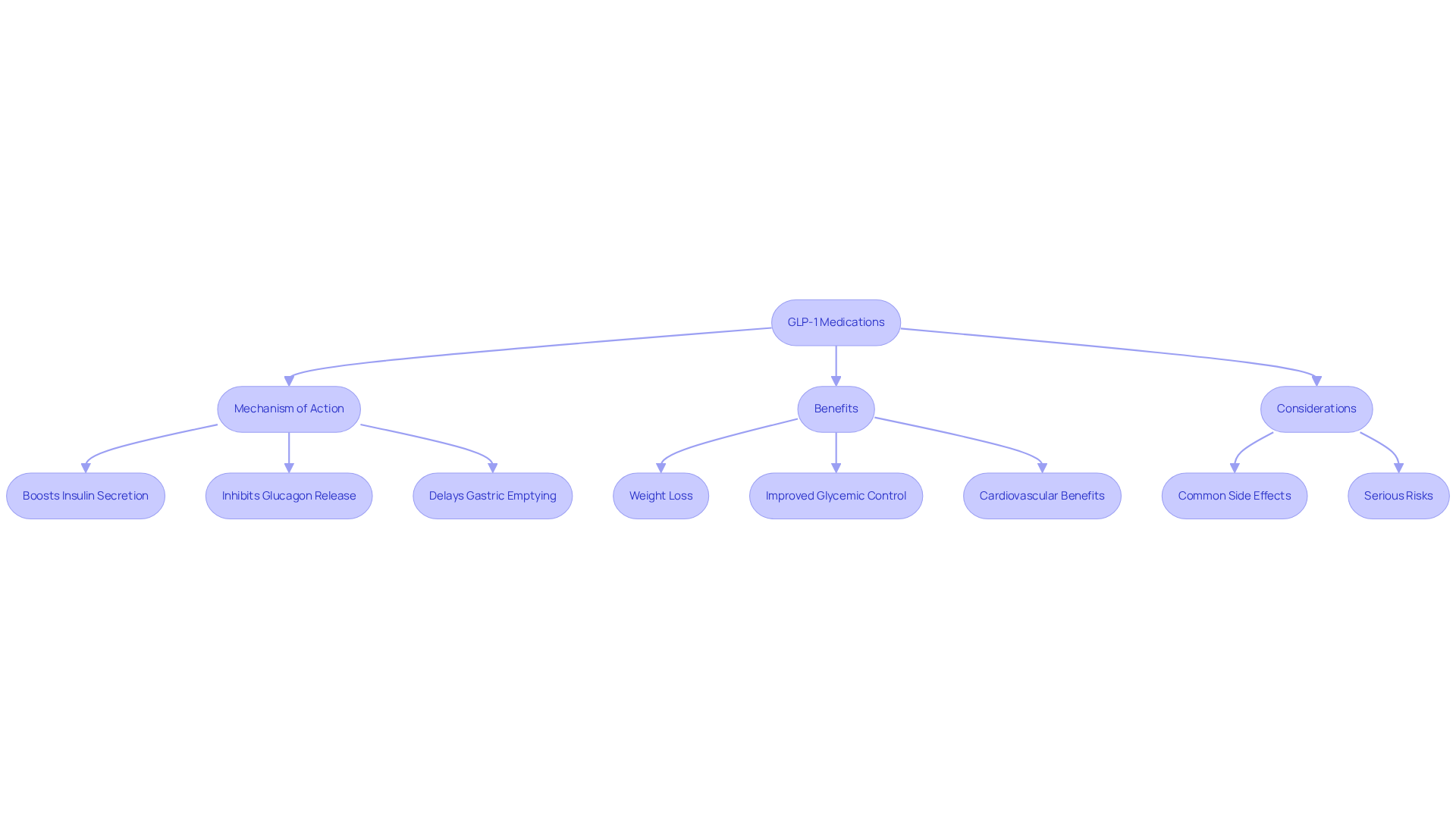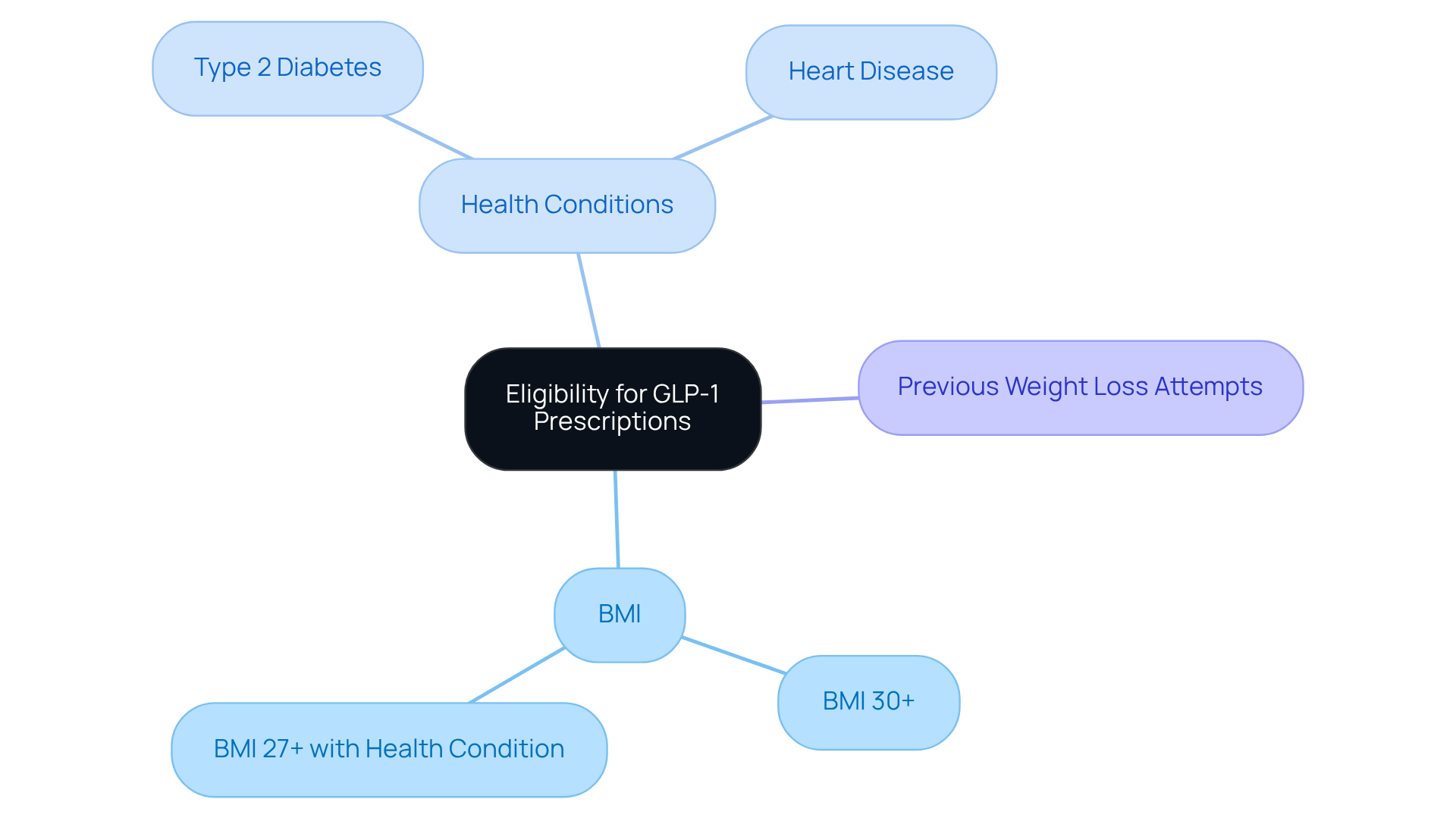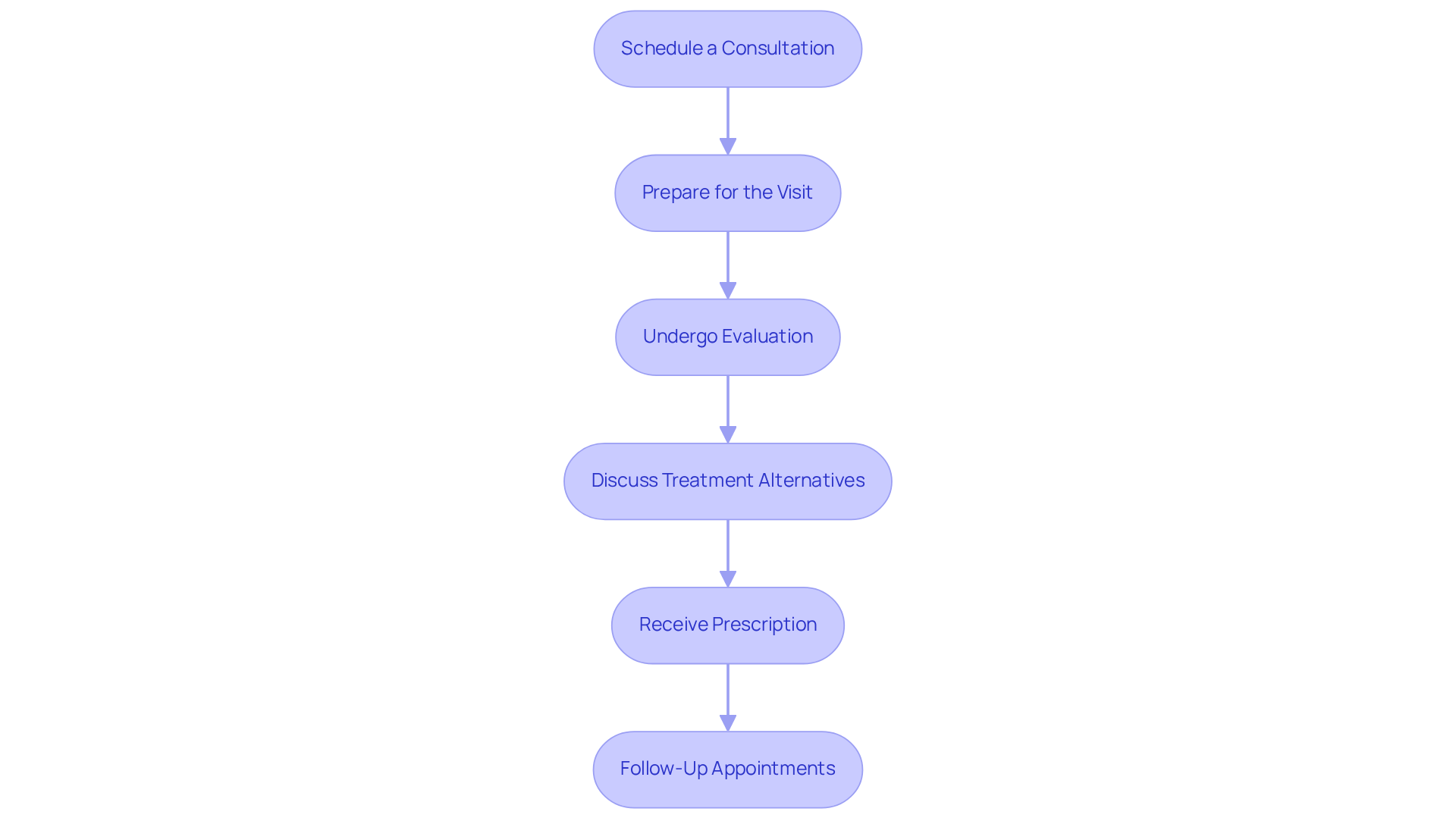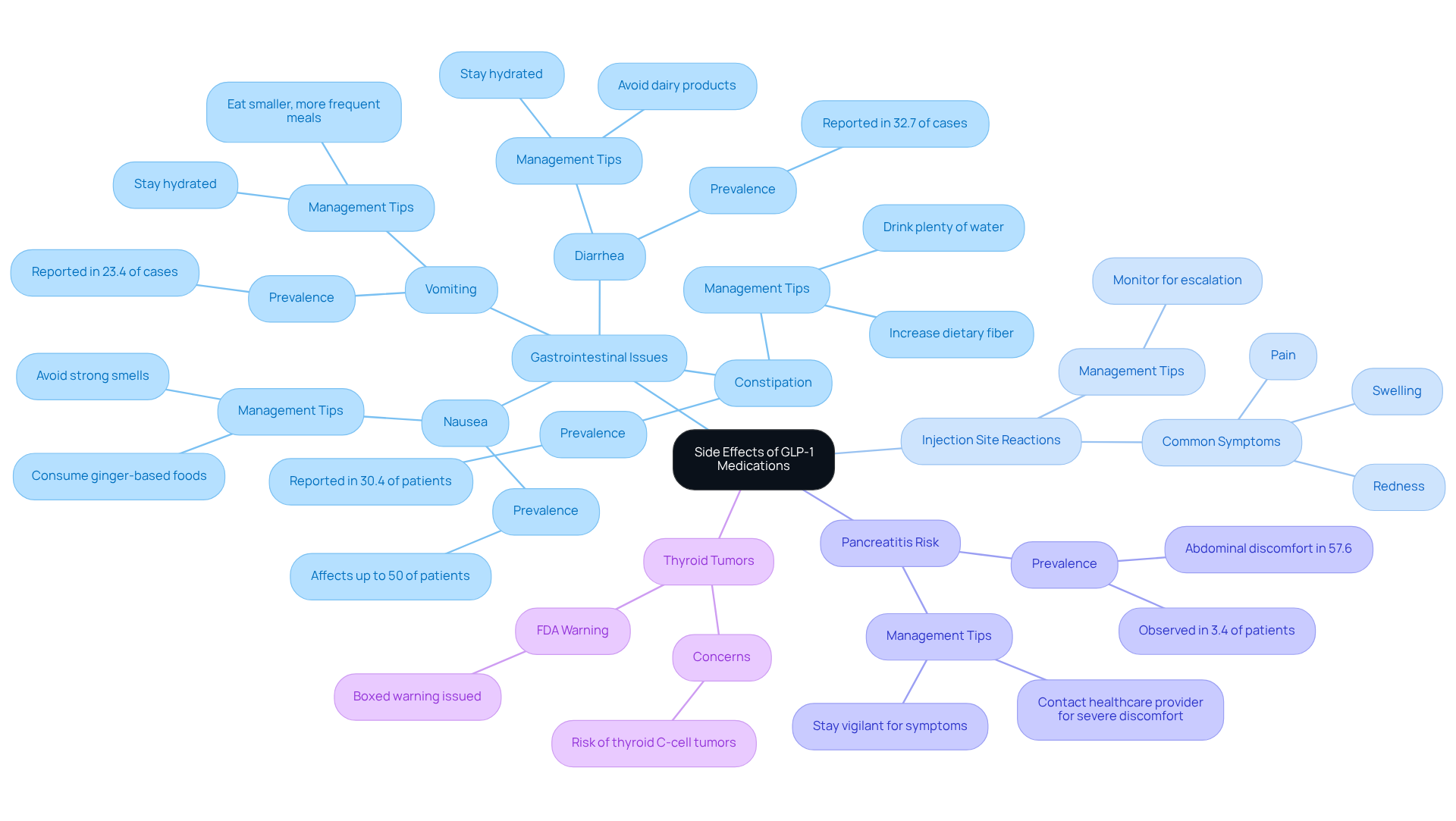Overview
If you’re considering GLP-1 medications, it’s important to approach this journey with care and understanding. Start by scheduling a consultation with a healthcare provider who can guide you through the process. Preparing your medical history is a key step, as it allows for a meaningful discussion about your eligibility based on criteria like BMI and existing health conditions.
This article outlines a step-by-step process, designed to make you feel supported every step of the way. It highlights not only the benefits of GLP-1 drugs for weight loss and diabetes management but also emphasizes the importance of ongoing support and monitoring for any side effects you may experience.
Remember, you’re not alone in this journey. Together, we can achieve your goals, and with the right support, you can navigate the challenges ahead with confidence. Take these steps to empower yourself and embrace a healthier future.
Introduction
Navigating the complexities of weight management and diabetes care can feel overwhelming, especially with the rising prevalence of obesity impacting millions. We understand that this journey can be daunting. That’s why GLP-1 medications have emerged as a promising solution, offering not only weight loss benefits but also improved blood sugar control and potential cardiovascular protection.
However, we recognize that understanding how to obtain a prescription for these medications can be a challenging journey, filled with questions about eligibility and side effects. What steps should you take to ensure you receive the right treatment tailored to your health needs? Together, we can explore the answers and help you find the support you deserve.
Understand GLP-1 Medications: Mechanism and Benefits
GLP-1 drugs, or glucagon-like peptide-1 receptor agonists, are designed to mimic the function of the GLP-1 hormone, which our bodies naturally produce in the gut. These treatments work by boosting insulin secretion, inhibiting glucagon release, and delaying gastric emptying. Together, these actions can help lower blood sugar levels and reduce appetite, making them a valuable option for many on their health journeys. At Minimal, compounded Tirzepatide represents a personalized approach to weight loss and holistic health, offering significant benefits for those seeking to improve their well-being.
Have you been struggling with weight loss? You’re not alone. Many users report experiencing substantial weight loss, with studies showing an average reduction of 12% to 20% of body weight. This is primarily due to decreased appetite and increased feelings of fullness. Minimal’s holistic weight loss solutions, including Metformin, start at just $99.99 per month, making them accessible for anyone looking for effective weight management.
For those managing type 2 diabetes, GLP-1 medications can be particularly beneficial. They effectively regulate blood sugar levels, leading to improved overall glycemic control and enhanced long-term A1C levels. This can bring peace of mind and a sense of control over one’s health.
Recent research also highlights the cardiovascular benefits of these medications. Some studies indicate that they may reduce the risk of major cardiovascular events, providing a dual-purpose treatment for obesity and diabetes. For example, the SELECT trial revealed a 20% reduction in significant cardiovascular events among participants using semaglutide, showcasing its comprehensive impact on health.
Understanding these processes is crucial for anyone considering how to get prescribed GLP-1, as it shows the potential benefits that extend beyond weight loss. However, it’s equally important to be aware of common side effects, such as nausea, stomach discomfort, potential diarrhea, and reduced vitamin B12 levels with long-term use. These factors can affect treatment adherence, and we want to ensure you feel supported throughout your journey. Additionally, while rare, serious risks like lactic acidosis may arise if the medication is not used correctly.
It’s essential to recognize that societal pressures related to weight loss can influence patients’ experiences with these treatments. This underscores the need for a supportive approach in managing one’s health journey. Remember, together, we can achieve your goals, and we’re here for you every step of the way.
Determine Eligibility: Who Should Consider GLP-1 Prescriptions?
To assess your eligibility for a GLP-1 prescription, let’s consider some important criteria that could help you on your journey:
- Body Mass Index (BMI): If your BMI is 30 or higher, you are classified as obese. However, even if your BMI is 27 or higher and you have at least one weight-related health condition, such as hypertension or type 2 diabetes, you may qualify for GLP-1 therapy.
- Health Conditions: It’s important to note that individuals with type 2 diabetes or heart disease often receive priority for specific prescriptions. These treatments can provide dual benefits, helping with weight loss while also enhancing blood sugar regulation.
- Previous Weight Loss Attempts: If you have tried other weight loss methods without success, you might be a strong candidate for this therapy.
Remember, discussing how to get prescribed GLP-1 with a healthcare professional is essential. They can help assess your individual health profile and determine if certain medications are suitable for you. With over 42.4% of U.S. adults affected by obesity, understanding these criteria can empower many individuals to discover effective treatment options tailored to their unique needs. Together, we can navigate this path toward better health.
Follow Steps to Obtain a GLP-1 Prescription: From Consultation to Medication
To obtain a GLP-1 prescription, specifically for Wegovy®, follow these supportive steps:
-
Schedule a Consultation: Take the first step by booking an appointment with a healthcare provider who specializes in body mass management or endocrinology. You can choose to meet in-person or explore telehealth options, which have become increasingly popular for consultations. This flexibility shows that you are not alone in this journey.
-
Prepare for the Visit: Gather your medical history, including previous weight loss efforts, current medications, and any relevant medical conditions. This preparation is essential for a fruitful discussion, helping your provider understand your unique situation.
-
Undergo Evaluation: During your consultation, your provider will assess your eligibility based on your BMI, medical conditions, and weight loss history. Blood tests may also be performed to ensure a thorough evaluation of your overall health. This comprehensive approach is key to finding the right support for you.
-
Discuss Treatment Alternatives: If deemed suitable, review the various medications available, including Wegovy®, which has been clinically validated to help individuals lose 15-20% of their body mass. It’s important to understand the benefits, such as improved blood sugar control and reduced heart disease risk, alongside potential side effects like nausea and gastrointestinal discomfort. Remember, as Dr. Lydia Alexander emphasizes, combining specific therapies with mindful, nutrient-rich eating habits is vital for lasting success. Together, we can explore what works best for you.
-
Receive Prescription: If you and your provider agree on a treatment plan, you will receive a prescription for the chosen medication, like Wegovy®. This decision should be made collaboratively, ensuring it aligns with your health goals and personal preferences. You are an active participant in your journey.
-
Follow-Up Appointments: Schedule regular follow-ups to monitor your progress and adjust your treatment plan as needed. Ongoing support is crucial; research shows that consistent consultations can significantly enhance weight loss results, with average placebo-adjusted reductions in weight of 5-18% in clinical trials for therapies like Wegovy®. Additionally, make sure you understand how to administer Wegovy® via subcutaneous injection once a week, rotating injection sites to minimize irritation.
By following these steps, you can navigate the process of understanding how to get prescribed GLP-1 for a weight-loss medication with confidence, ensuring that you receive the tailored support and treatment you deserve. Remember, we’re here for you every step of the way.
Address Common Concerns: Side Effects and Safety of GLP-1 Medications
While these medications are generally considered safe, it’s important to be aware of potential side effects. Understanding these can help you navigate your health journey more effectively. Here are some common side effects you should know about:
- Gastrointestinal Issues: Many patients report nausea, vomiting, diarrhea, and constipation, particularly during the initial treatment phase. For example, studies show that nausea affects up to 50% of patients, with nausea and vomiting occurring in 23.4% of cases. Diarrhea is reported in about 32.7% of cases. Managing these symptoms often involves simple dietary adjustments, like staying hydrated and avoiding dairy products and high-fiber foods until you feel better.
- Injection Site Reactions: It’s not uncommon to experience some redness, swelling, or pain at the injection site. These reactions are usually mild and resolve on their own, but it’s essential to monitor them to ensure they don’t escalate.
- Pancreatitis Risk: There is a potential risk of pancreatitis, which can cause severe abdominal pain. Reports indicate that abdominal discomfort is the most frequent gastrointestinal side effect, occurring in 57.6% of individuals using receptor agonists. Pancreatitis itself has been observed in 3.4% of patients, so it’s crucial to stay vigilant for symptoms and reach out to your healthcare provider if you experience severe discomfort.
- Thyroid Tumors: Animal studies have raised concerns about a risk of thyroid C-cell tumors, leading the FDA to issue a boxed warning. While meta-analyses do not indicate a heightened risk of pancreatic or thyroid cancer with receptor agonists, it’s essential to discuss any concerns with your healthcare professional.
Engaging in an open dialogue with your healthcare provider is vital for effectively managing side effects and understanding how to get prescribed GLP-1 medications, determining if they are the right fit for your health journey. Remember, we’re here for you, and together, we can achieve your goals.
Conclusion
Understanding the process of obtaining GLP-1 prescriptions is essential for individuals seeking effective weight management and diabetes control. These medications offer a multifaceted approach to health improvement by mimicking natural hormones to regulate blood sugar and appetite. With the right guidance and support, patients can navigate the prescription process to find a treatment that aligns with their health goals.
Key insights from this guide highlight:
- The mechanisms and benefits of GLP-1 medications
- The eligibility criteria for potential candidates
- The step-by-step process to secure a prescription
By emphasizing the importance of consultations, thorough evaluations, and ongoing support, individuals can feel empowered to take control of their health journeys. Furthermore, awareness of potential side effects ensures that patients can make informed decisions about their treatment options.
Ultimately, the significance of GLP-1 medications extends beyond mere weight loss; they represent a holistic approach to managing chronic conditions and improving overall well-being. Individuals are encouraged to engage in open conversations with healthcare professionals to explore these options, ensuring that they receive the personalized care necessary for success. Taking the first step toward a healthier future can lead to transformative outcomes, and support is available every step of the way.
Frequently Asked Questions
What are GLP-1 medications and how do they work?
GLP-1 medications, or glucagon-like peptide-1 receptor agonists, mimic the GLP-1 hormone produced in the gut. They boost insulin secretion, inhibit glucagon release, and delay gastric emptying, which helps lower blood sugar levels and reduce appetite.
What benefits do GLP-1 medications offer for weight loss?
Users of GLP-1 medications often report significant weight loss, with studies showing an average reduction of 12% to 20% of body weight, primarily due to decreased appetite and increased feelings of fullness.
How do GLP-1 medications help those with type 2 diabetes?
GLP-1 medications effectively regulate blood sugar levels, leading to improved overall glycemic control and better long-term A1C levels, providing patients with a sense of control over their health.
Are there cardiovascular benefits associated with GLP-1 medications?
Yes, recent research suggests that GLP-1 medications may reduce the risk of major cardiovascular events. For instance, the SELECT trial showed a 20% reduction in significant cardiovascular events among participants using semaglutide.
What are some common side effects of GLP-1 medications?
Common side effects include nausea, stomach discomfort, potential diarrhea, and reduced vitamin B12 levels with long-term use.
Are there any serious risks associated with GLP-1 medications?
While rare, serious risks such as lactic acidosis may occur if the medication is not used correctly.
How can societal pressures affect the experience of patients using GLP-1 medications?
Societal pressures related to weight loss can influence patients’ experiences, highlighting the importance of a supportive approach in managing one’s health journey.
What support is available for those considering GLP-1 medications?
It is essential to have support throughout the treatment journey, as healthcare providers aim to assist patients in achieving their health goals effectively.





















